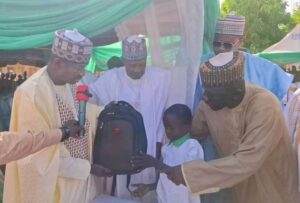


First Lady advocates for education, empowerment of the girl-child
By Sodiw Adelakun
Mrs Patience Jonathan, wife of former President Goodluck Jonathan, has advised schoolgirls against prostitution and drug abuse.
Jonathan gave the advice in Abuja on Monday, at the National Female Students Conference and launching of maiden Magazine tagged, “The Face of Women’s Libbers.”
The event was organised by the National Association of Female Students (ANFS) as part of activities to commemorate the 2024 International Day of the Girl Child.
Represented by Mrs Safiya Ogo, Director-General, Women of Change Initiative, the former First Lady noted the involvement of young girls in all kinds of social vices.
She identified some of the ungodly activities as drug abuse, prostitution, girl child trafficking, alcoholism, cultism, cybercrimes, indecent dressing and rituals among others.
Jonathan, adopted as the Grand Matron of ANFS at the event, described the development as “worrisome,” adding that such absurd actions were taking a toll on young girls, particularly female undergraduate students.
“These practices are undoubtedly barriers to the achievement of the goals and aspirations of these girls and women.
“We also have had reports of young girls who are victims of yahoo’ rituals, resulting mostly from the crave for quick wealth.
“This craving for quick wealth can be achieved through hard work and selflessness, while maintaining one’s dignity as a woman,” she said.
Jonathan, therefore, urged the female students to shun prostitution, drug abuse and all manner of vices but instead, be role models with dignity as women, wives and mothers.
She advised the ANFS to embark on a massive campaign to sensitise female students, including the males, to remain focused and law abiding for them to excel in their chosen careers.
“You are not only the future mothers and wives of this country, but also future leaders, businesswomen, heads of parastatals and captains of industries.
“We live in a competitive world, therefore, in preparation for your future role, you must be well equipped and excel in your various professional callings.
“One way to equip our girls ahead of these positions is the girl-child education. This is because education is the key to development,” she said.
Also, Dr Adedayo Benjamins-Laniyi, Mandate Secretary, Women Affairs Secretariat, Federal Capital Territory Administration, stressed the need to celebrate the potential, resilience, and achievements of girls everywhere.
Benjamins-Laniyi, who was also adopted as the Matron of the association in FCT, described girls’ education as the cornerstone of societal progress.
According to her, education unlocks opportunities, breaks cycles of poverty, and fosters inclusive growth.
Similarly, Dr Jumai Ahmadu, founder and Executive Director, Helpline advised female students to continue to raise their voices for change through positive activism.
Ahmadu, however, stressed the need for the students to be serious with their academics and aspire for greatness.
Earlier, the National President of ANFS, Omoniyi Alice, said that the event was organised to discuss the future of female students across the world.
This, according to Alice, will ensure that female students are given every opportunity to succeed.
“We live in a world that is rapidly changing, and it is essential that we adapt our education system to meet these changes.
“As the future leaders of our society, it is crucial that our female students are given every opportunity to excel and be able to compete on a level playing field, free from discrimination or unfair barriers.
“We must also provide our female students with the resources they need to succeed. These include access to quality education, mentorship programmes, and scholarships.
“It is our responsibility as educators and leaders to ensure that our female students have the tools they need to succeed,” she added.
Alice equally called on relevant stakeholders to promote a culture of inclusion and respect for women in schools and universities.
“This means creating an environment where women feel safe and supported, where they are valued for their contributions and their ideas.
“We must also challenge the traditional gender roles that have limited women’s opportunities in the past,” the president said.
On her part, the founder and pioneer president of the association, Safiya Sarki, said that ANSF was established to give female student a voice.
Sarki explained that the move was in response to the male-dominated National Association of Nigerian Students, where only two seats were reserved for females out of the 15 leadership positions in the association.



